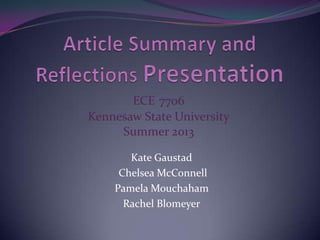This document contains a discussion between Kate Gaustad, Chelsea McConnell, Pamela Mouchaham, and Rachel Blomeyer about key ideas from their readings on teaching science in elementary schools. They discuss the importance of inquiry-based learning, integration across subjects, inclusion of all students' needs, and using authentic assessments rather than standardized tests. The discussion also addresses the shortage of qualified science teachers and how to make science concepts stick with students over multiple lessons using hands-on activities. The bibliography cites research articles on STEM education, technology in science teaching, and the lack of science teachers.













![Bibliography
Dejarnette, N. K. (2012). America's Children: Providing Early Exposure to STEM
(Science, Technology, Engineering and Math) Initiatives. Education, 77-84.
Flick, L., & Bell, R. (2000). Preparing tomorrow's science teachers to use
technology: Guidelines for Science educators. Contemporary Issues in
Technology and Teacher Education [Online serial], 1 (1). Retrieved from
:http://www.citejournal.org/vol1/iss1/currentissues/science/article1.htm
Guney, B. G., & Seker, H. (2012). The Use of History of Science as a Cultural Tool to
Promote Students' Empathy with the Culture of Science. Educational Sciences:
Theory And Practice, 12(1), 533-539.
Mangrubang, F.R. (2005). Issues and Trends in Science Education: The Shortage of
Qualified Science Teachers. American Annals of the Deaf, 150(1), 41-46.
Sandall, B. R. (2003). Elementary Science: Where Are We Now? Journal of
Elementary Science Education, 13-30.](https://image.slidesharecdn.com/articlesummaryandreflectionspresentation-130709120542-phpapp01/85/Article-Summary-and-Reflections-Group-Presentation-14-320.jpg)